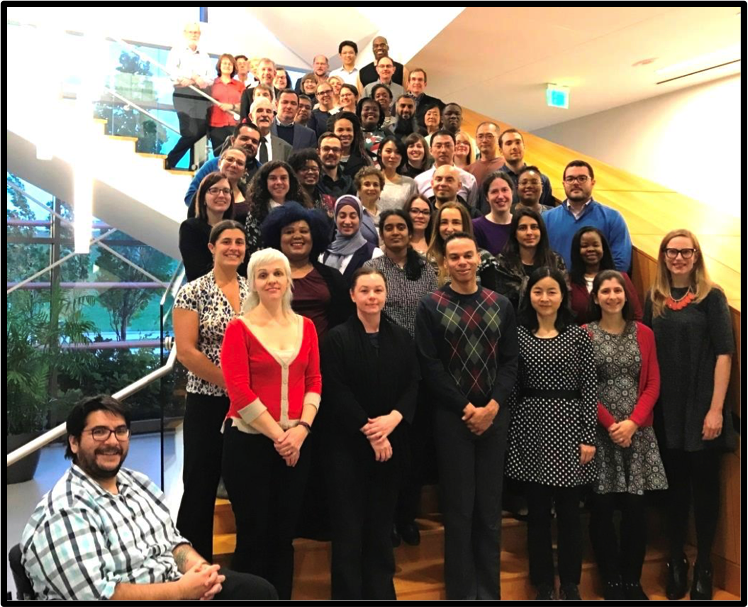
Attendees at the 3rd annual NRMN-CAN Professional Development and Grantwriting Conference, October 29-31, 2017.
Written by Laurie Risner
NRMN-CAN held its 3rd Annual Professional Development and Grantwriting Conference, Passport to Success: From Teaching to Grantsmanship, October 29 – 31, 2017 at the Big Ten Conference Center in Rosemont, IL. The 72 attendees from 13 Big Ten institutions and 4 guest institutions included 43 postdoctoral and junior faculty trainees (44%from underrepresented backgrounds), 12 faculty grantsmanship coaches and 17 NRMN-CAN guest presenters and committee members.
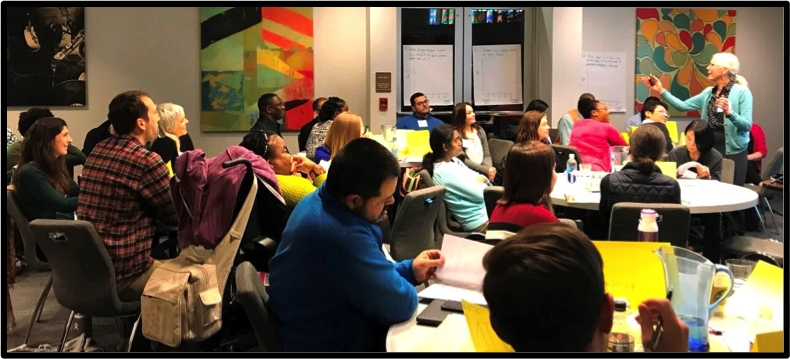
Dr. Diana Ebert-May of Michigan State University opens the NRMN-CAN conference with a workshop on Scientific Teaching for the postdoc and junior faculty participants.
The Conference kicked off on Sunday evening, October 29th, in the Aloft Hotel Conference Center. After a networking reception, NRMN-CAN PI, Dr. Nancy Schwartz of the University of Chicago, welcomed the trainees to the conference and introduced the NRMN-CAN Conference Co-Chairs, Dr. Xenia Morin, Rutgers University, and Dr. Blessing Enekwe, University of Maryland. Dr. Schwartz then introduced the opening workshop guest speaker, Dr. Diane Ebert-May, University Distinguished Professor of Michigan State University. Dr. Ebert-May is an international expert on Scientific Teaching and promotes professional development, assessment and improvement of faculty, postdoctoral scholars, and graduate students who actively participate in research about teaching and learning in the context of their scientific discipline. Her opening workshop introduced the participants to the principles of Scientific Teaching which involves students using the practices of science to effectively learn science in the classroom.
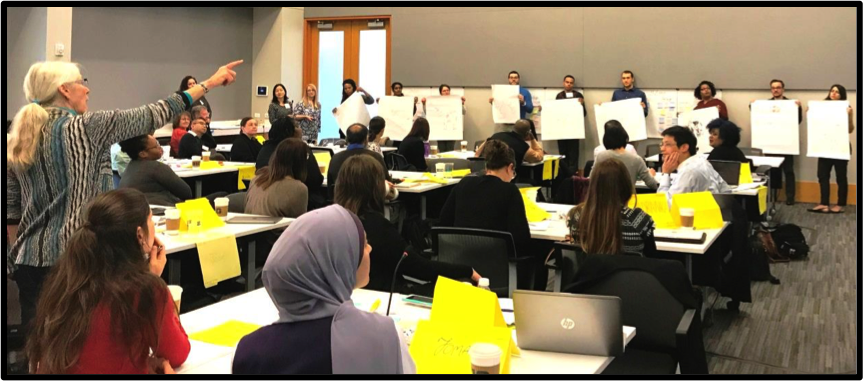
Dr. Ebert-May presents the second half of her Scientific Teaching Workshop at the Big Ten Conference Center.
On Monday morning, October 30th, Drs. Morin and Enekwe gave a brief overview of the conference agenda and goals, and then Dr. Ebert-May continued with the second half of her Scientific Teaching Workshop for the participants. The postdocs and junior faculty members in attendance learned much about how to engage their students in the classroom to learn core concepts.

The Rutgers University faculty and postdoc grantwriting group meets to discuss and develop the participants’ grant applications.
That afternoon, the NRMN-CAN faculty coaches arrived at the Big Ten Conference Center to start their training as grantsmanship coaches with Dr. Rick McGee of Northwestern University Feinberg School of Medicine and the NRMN Professional Development Core. These experienced faculty members were trained by Dr. McGee to use the NRMN NU group coaching method to help the trainees to refine their grant applications starting with the Specific Aims. The 12 faculty coaches included 8 returning and 5 new coaches to NRMN-CAN, representing 8 institutions.
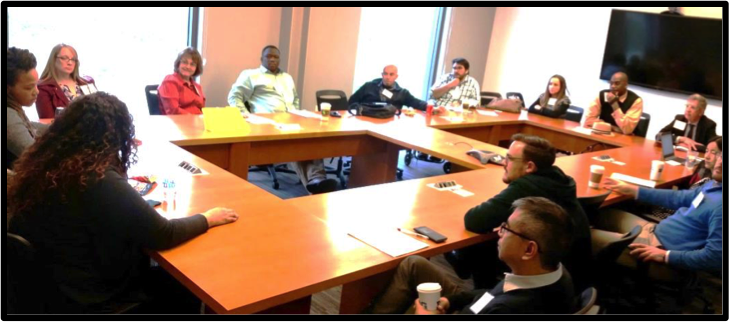
Dr. Jennifer Obando and Dr. Xenia Morin of Rutgers University meet with the junior faculty participants to discuss challenges in their classrooms.
To open the afternoon professional development sessions, Dr. Jeniffer Obando, Senior Instructional Designer from Rutgers University, delivered a workshop titled, “Introduction to Instructional Design: The Whys and Hows” for the postdocs and junior faculty participants. Dr. Obando’s workshop enforced and expanded upon many of the themes from Diane Ebert-May’s workshop about the learning needs of students and how to develop effective instruction, and she explained how postdocs or faculty can work with Instructional Designers on their campuses to implement their courses.
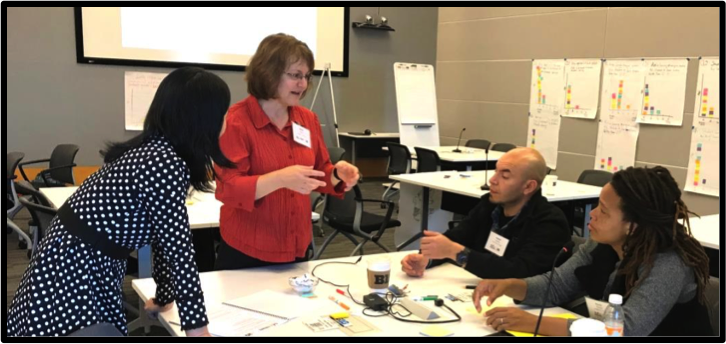
Dr. Xena Morin instructs NRMN-CAN participants at the Big Ten Conference Center.
After Dr. Obando’s workshop, breakout sessions were offered for the postdocs and junior faculty. Postdocs attended a Teaching Philosophy Statement workshop, which was led by Drs. William Rando, Director, and Angelika Zissimopoulos, Associate Director, of the Chicago Center for Teaching at the University of Chicago. Postdocs learned about the essential components of the Teaching Statement and how to incorporate their teaching experiences and goals into the document, as well as the importance of the statement for their future academic job application package. Meanwhile, junior faculty participants attended a Teaching Problem Solving Session with Drs. Obando and Morin that focused on their current teaching challenges in their classrooms.
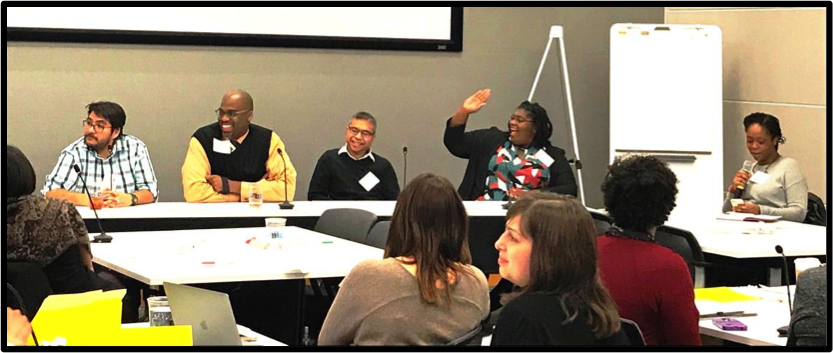
For the final professional development session, a panel discussion featured four of the junior faculty participants in attendance.
For the final professional development session of the day on Monday, all participants came back together for a panel discussion that featured several of the junior faculty members in attendance: Jorge A Cantú, PhD, Northeastern Illinois University; Larry Charleston IV, MD, MSc, University of Michigan; Timiya Nolan, PhD, MSN, The Ohio State University; and Alfredo Garcia, PhD, University of Chicago. Conference Co-chair Dr. Blessing Enekwe facilitated the discussion which focused on the first years of teaching as a new faculty member and advice for their fellow NRMN-CAN participants. Participants were able to continue their discussions during a networking reception in the Big Ten Conference Center which capped the first day of the conference.
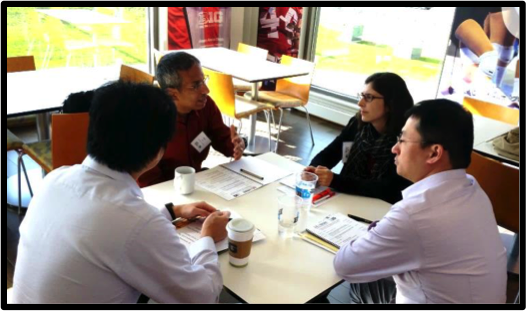
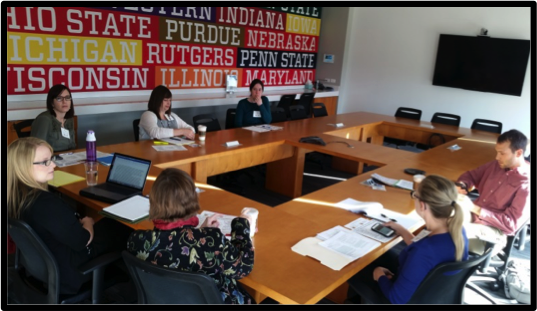
Grantwriting groups from Northwestern University (top) and University of Wisconsin-Madison (bottom) start working on the participants’ grant applications at the NRMN-CAN conference.
On Day 2, the program shifted its focus to grantwriting. On Tuesday morning, Dr. Rick McGee, Northwestern University and the NRMN Professional Development Core, led the Grant Writing Coaching Groups Kick-off and demonstrated the coached writing group method. After this instructional session, the coaches and trainees broke out into 10 NRMN-CAN grantwriting groups to get to work on the Specific Aims sections that the trainees had prepared. These groups will continue meeting on home campuses or virtually until the trainees’ grants are submitted. For a second year, NRMN-CAN also offered an alternative “Grantwriting 101” informational track for the trainees who were not yet ready to join a grantwriting group, which was led by NRMN-CAN Conference Co-Chair, Dr. Xenia Morin.
The NRMN-CAN conference wrapped up with the trainees completing their “Passport to Success” document to summarize take home messages from the conference and follow up steps for their return to campus. The NRMN-CAN participants offered much positive feedback about the teaching workshops and the grantwriting group work, and found the networking opportunities at the conference extremely valuable to their careers. NRMN-CAN is currently planning their Spring 2018 Mentor Training Workshops.